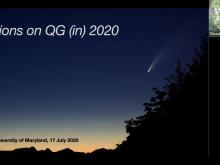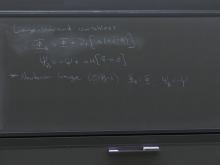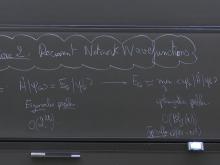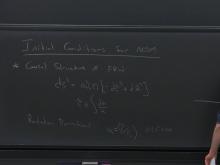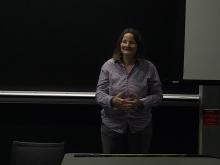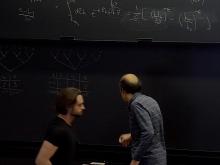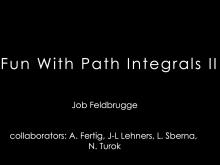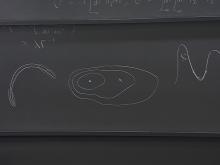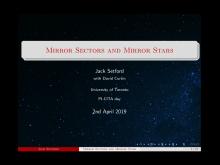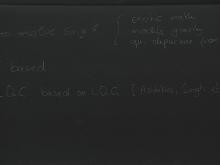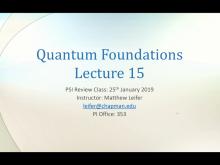Cosmologists at Perimeter Institute seek to help pin down the constituents and history of our universe, and the rules governing its origin and evolution. Many of the most interesting clues about physics beyond the standard model (e.g., dark matter, dark energy, the matter/anti-matter asymmetry, and the spectrum of primordial density perturbations], come from cosmological observations, and cosmological observations are often the best way to test or constrain a proposed modification of the laws of nature, since such observations can probe length scales, time scales, and energy scales that are beyond the reach of terrestrial laboratories.
Format results
-
22 talks-Collection NumberC20031
Talk
-

Welcome and Opening Remarks
Bianca Dittrich Perimeter Institute for Theoretical Physics
-

Approaches to Quantum Gravity: Key Achievements and Open Issues
Hermann Nicolai Max-Planck-Institut für Gravitationsphysik
-

Quantum gravity from the loop perspective
Alejandro Perez Aix-Marseille University
-

Lessons for quantum gravity from quantum information theory
Daniel Harlow Massachusetts Institute of Technology (MIT)
-

Understanding of QG from string theory
Herman Verlinde Princeton University
-

Progress in horizon thermodynamics
Aron Wall University of Cambridge
-

Asymptotically Safe Amplitudes from the Quantum Effective Action
Frank Saueressig Radboud Universiteit Nijmegen
-

The Remarkable Roundness of the Quantum Universe
Renate Loll Radboud Universiteit Nijmegen
-
-
PSI 2019/2020 - Cosmology Part 2
2 talks-Collection NumberC20015Talk
-

PSI 2019/2020 - Cosmology Part 2 - Lecture 1
Matthew Johnson York University
-

PSI 2019/2020 - Cosmology Part 2 - Lecture 2
Matthew Johnson York University
-
-
PSI 2019/2020 - Machine Learning for Many-Body Physics
2 talks-Collection NumberC20012Talk
-

PSI 2019/2020 - Machine Learning for Many-Body Physics - Lecture 1
Mohamed Hibat Allah University of Waterloo
-

PSI 2019/2020 - Machine Learning for Many-Body Physics - Lecture 2
Mohamed Hibat Allah University of Waterloo
-
-
PSI 2019/2020 - Cosmology (Part 1)
8 talks-Collection NumberC20009Talk
-

PSI 2019/2020 - Cosmology Part 1 - Lecture 1
Matthew Johnson York University
-

PSI 2019/2020 - Cosmology Part 1 - Lecture 2
Matthew Johnson York University
-

PSI 2019/2020 - Cosmology Part 1 - Lecture 3
Matthew Johnson York University
-

PSI 2019/2020 - Cosmology Part 1 - Lecture 4
Matthew Johnson York University
-

PSI 2019/2020 - Cosmology Part 1 - Lecture 5
Matthew Johnson York University
-

PSI 2019/2020 - Cosmology Part 1 - Lecture 6
Matthew Johnson York University
-

PSI 2019/2020 - Cosmology Part 1 - Lecture 7
Matthew Johnson York University
-

PSI 2019/2020 - Cosmology Part 1 - Lecture 8
Matthew Johnson York University
-
-
Emmy Noether Workshop: The Structure of Quantum Space Time
25 talks-Collection NumberC19047Talk
-

Welcome and Opening Remarks
Bianca Dittrich Perimeter Institute for Theoretical Physics
-

Quantum Spacetime from Lattice Gravity à la CDT
Renate Loll Radboud Universiteit Nijmegen
-

How complement maps can cure divergences
Sylvie Paycha University of Potsdam
-

The gravitational Wilson loop and the non-Abelian Stokes' theorem
Reiko Toriumi Okinawa Institute of Science and Technology Graduate University
-

The dynamics of difference
Lee Smolin Perimeter Institute for Theoretical Physics
-

-

Probing fundamental physics with gravitational waves
Cecilia Chirenti Universidade Federal do ABC
-

Implications of the Quantum Nature Space-time for the Big Bang and Black Holes
Abhay Ashtekar Pennsylvania State University
-
-
Everpresent Lambda: Theory Meets Observations
15 talks-Collection NumberC19046Talk
-

-

Introduction to Everpresent Lambda
Rafael Sorkin Perimeter Institute for Theoretical Physics
-

Status of Hubble tension in Cosmology
Niayesh Afshordi University of Waterloo
-

Causal Set Action/Entropy
Yasaman Kouchekzadeh Yazdi Dublin Institute For Advanced Studies
-

Observational constraints on modified gravity and dark energy
Jian Li Simon Fraser University (SFU)
-

Supplementary considerations on Everpresent Lambda
Rafael Sorkin Perimeter Institute for Theoretical Physics
-

-

Implementing a stochastic dark energy framework into CAMB
Levon Pogosian Simon Fraser University (SFU)
-
-
Simplicity III
17 talks-Collection NumberC19044Talk
-

On the possible role of nilpotent internal symmetries in unification
Andras Laszlo Wigner Research Centre for Physics
-

Rethinking the origin of neutrino masses: the role of gravity
Lena Funcke University of Bonn
-

Swampland Constraints on Neutrino Masses and Dark Energy
Irene Valenzuela European Organization for Nuclear Research (CERN)
-

-

Exceptional Quantum Algebra for the Standard Model of Particle Physics
Ivan Todorov Bulgarian Academy of Sciences
-

SO(7,7) Structure of Standard Model Fermions
Kirill Krasnov University of Nottingham
-

The Standard Model from A Jordan Algebra
Latham Boyle University of Edinburgh
-

Particle Theory from Jordan Geometry
Shane Farnsworth University of Regensburg
-
-
Cosmological Frontiers in Fundamental Physics 2019
22 talks-Collection NumberC19037Talk
-

CPT-Symmetric Universe
Latham Boyle University of Edinburgh
-

Brane cosmology and the self-tuning of the cosmological constant
Francesco Nitti Université Paris Cité
-

New Physics in the Rayleigh-Jeans tale of the CMB and cosmic 21cm signal
Maxim Pospelov University of Minnesota
-

Gravitational waves in the inhomogeneous Universe
Masamune Oguri University of Tokyo
-

-

Discussion: Where in the Cosmos should we look for novel physics?
Elias Kiritsis University of Crete
-

Gravitational wave standard sirens
Samaya Nissanke University of Amsterdam
-

Cosmology and fundamental physics with FRBs
Ue-Li Pen Canadian Institute for Theoretical Astrophysics (CITA)
-
-
PSI 2018/2019 - Explorations in Cosmology (Smith)
13 talks-Collection NumberC19020Talk
-

PSI 2018/2019 - Explorations in Cosmology - Lecture 1
Kendrick Smith Perimeter Institute for Theoretical Physics
-

PSI 2018/2019 - Explorations in Cosmology - Lecture 2
Kendrick Smith Perimeter Institute for Theoretical Physics
-

PSI 2018/2019 - Explorations in Cosmology - Lecture 3
Kendrick Smith Perimeter Institute for Theoretical Physics
-

PSI 2018/2019 - Explorations in Cosmology - Lecture 4
Kendrick Smith Perimeter Institute for Theoretical Physics
-

PSI 2018/2019 - Explorations in Cosmology - Lecture 5
Kendrick Smith Perimeter Institute for Theoretical Physics
-

PSI 2018/2019 - Explorations in Cosmology - Lecture 6
Kendrick Smith Perimeter Institute for Theoretical Physics
-

PSI 2018/2019 - Explorations in Cosmology - Lecture 7
Kendrick Smith Perimeter Institute for Theoretical Physics
-

PSI 2018/2019 - Explorations in Cosmology - Lecture 8
Kendrick Smith Perimeter Institute for Theoretical Physics
-
-
PI-CITA Day 2019
6 talks-Collection NumberC19016Talk
-

Angular momentum radiated by electromagnetic vs gravitational waves
Beatrice Bonga Radboud Universiteit Nijmegen
-

Ultralight axions and Future CMB experiments
Renee Hlozek University of Toronto
-

Not extending the standard cosmological model
Andrew Liddle University of Lisbon
-

The Astrophysics of Cosmic Rays
Tova M. Yoast-Hull Canadian Institute for Theoretical Astrophysics (CITA)
-

The existence and stability of marginally trapped surfaces
Erik Schnetter Perimeter Institute for Theoretical Physics
-

-
-
PSI 2018/2019 - Cosmology Review (Xu)
15 talks-Collection NumberC19001Talk
-

PSI 2018/2019 - Cosmology Review - Lecture 1
Gang Xu Perimeter Institute for Theoretical Physics
-

PSI 2018/2019 - Cosmology Review - Lecture 2
Gang Xu Perimeter Institute for Theoretical Physics
-

PSI 2018/2019 - Cosmology Review - Lecture 3
Gang Xu Perimeter Institute for Theoretical Physics
-

PSI 2018/2019 - Cosmology Review - Lecture 4
Gang Xu Perimeter Institute for Theoretical Physics
-

PSI 2018/2019 - Cosmology Review - Lecture 5
Gang Xu Perimeter Institute for Theoretical Physics
-

PSI 2018/2019 - Cosmology Review - Lecture 6
Gang Xu Perimeter Institute for Theoretical Physics
-

PSI 2018/2019 - Cosmology Review - Lecture 7
Gang Xu Perimeter Institute for Theoretical Physics
-

PSI 2018/2019 - Cosmology Review - Lecture 8
Gang Xu Perimeter Institute for Theoretical Physics
-
-
PSI 2018/2019 - Foundations of Quantum Mechanics (Leifer)
15 talks-Collection NumberC19002Talk
-

PSI 2018/2019 - Foundations of Quantum Mechanics - Lecture 1
Matthew Leifer Chapman University
PIRSA:19010017 -

PSI 2018/2019 - Foundations of Quantum Mechanics - Lecture 2
Matthew Leifer Chapman University
PIRSA:19010018 -

PSI 2018/2019 - Foundations of Quantum Mechanics - Lecture 3
Matthew Leifer Chapman University
PIRSA:19010019 -

PSI 2018/2019 - Foundations of Quantum Mechanics - Lecture 4
Matthew Leifer Chapman University
PIRSA:19010020 -

PSI 2018/2019 - Foundations of Quantum Mechanics - Lecture 5
Matthew Leifer Chapman University
PIRSA:19010021 -

PSI 2018/2019 - Foundations of Quantum Mechanics - Lecture 6
Matthew Leifer Chapman University
PIRSA:19010022 -

PSI 2018/2019 - Foundations of Quantum Mechanics - Lecture 7
Matthew Leifer Chapman University
PIRSA:19010023 -

PSI 2018/2019 - Foundations of Quantum Mechanics - Lecture 8
Matthew Leifer Chapman University
PIRSA:19010024
-
-
Quantum Gravity 2020
22 talks-Collection NumberC20031 -
-
PSI 2019/2020 - Machine Learning for Many-Body Physics
2 talks-Collection NumberC20012PSI 2019/2020 - Machine Learning for Many-Body Physics -
PSI 2019/2020 - Cosmology (Part 1)
8 talks-Collection NumberC20009PSI 2019/2020 - Cosmology (Part 1) -
Emmy Noether Workshop: The Structure of Quantum Space Time
25 talks-Collection NumberC19047Understanding the small-scale structure of spacetime is one of the biggest challenges faced by modern theoretical physics. There are many different attempts to solve this problem and they reflect the diversity of approaches to quantum gravity. This workshop will bring together researchers from a wide range of quantum gravity approaches and give them an opportunity to exchange ideas and gain new insights.
-
Everpresent Lambda: Theory Meets Observations
15 talks-Collection NumberC19046One of the biggest mysteries in cosmology and fundamental physics is the nature of dark energy that is responsible for the current acceleration of cosmic expansion. While a cosmological constant provides the simplest model of dark energy recent observational tensions amongst supernovae Ia gravitational lensing time delays and cosmic microwave background suggest the need for a more complex dynamical dark energy. One of the oldest proposals for a dynamical dark energy is Everpresent Lambda proposed by Sorkin which is inspired by the causal set model of quantum gravity. It was recently shown that this model can potentially resolve the tensions in cosmological observations. The meeting aims to bring together a small number of experts in quantum gravity causal sets and cosmology to carefully examine the models theoretical predictions and its observational tests and pave the way for what might be an(other) exciting insight from cosmology into the fundamental nature of spacetime.
-
Simplicity III
17 talks-Collection NumberC19044This cross-disciplinary workshop gathers theorists who have been working on novel approaches to understanding the structure of the Standard Model and its link to cosmology and gravity. It follows the previous Simplicity I and II workshops at Princeton University (2014) and Fermilab (2016) and will be a small informal meeting with plenty of room for discussions.
-
Cosmological Frontiers in Fundamental Physics 2019
22 talks-Collection NumberC19037The workshops focuses on novel frontiers in observational cosmology and astrophysics and how they shed light fundamental questions in understanding the universe. Registration for this workshop is now open.
-
PSI 2018/2019 - Explorations in Cosmology (Smith)
13 talks-Collection NumberC19020PSI 2018/2019 - Explorations in Cosmology (Smith) -
PI-CITA Day 2019
6 talks-Collection NumberC19016This is an ongoing series of meetings held two or three times per year between researchers at Perimeter Institute and CITA. The goal of these meetings is to share new ideas and encourage interaction in PI and CITA's common fields of interest through a series of informal talks followed by discussions.
-
PSI 2018/2019 - Cosmology Review (Xu)
15 talks-Collection NumberC19001PSI 2018/2019 - Cosmology Review (Xu) -
PSI 2018/2019 - Foundations of Quantum Mechanics (Leifer)
15 talks-Collection NumberC19002PSI 2018/2019 - Foundations of Quantum Mechanics (Leifer)
